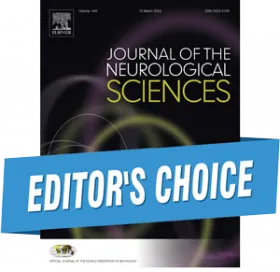
Image: iStockphoto.com
Authors: A.A. Tamborska, G.K. Wood, E. Westenberg , D. Garcia-Azorin , G. Webb , N. Schiess , M. Netravathi , B. Baykan , R. Dervaj , R. Helbok , S. Lant, A. Özge , A. Padovani, D. Saylor, E. Schmutzhard, A. Easton, J.B. Lilleker, T. Jackson, E. Beghi, M.A. Ellul, J.A. Frontera, T. Pollak, T.R. Nicholson, N. Wood, K.T. Thakur, T. Solomon, R.J. Stark, A.S. Winkler, B.D. Michael
Editor's Choice
Journal of the Neurological Sciences. RESEARCH ARTICLE| VOLUME 449, 120646, JUNE 15, 2023
Open Access
DOI: https://doi.org/10.1016/j.jns.2023.120646 ⧉
Highlights
- 146 clinicians from 45 countries on six continents assessed ten scenarios of acute neurological complications of COVID-19.
- Using case definitions, non-neurologists achieved similar diagnostic accuracy to neurologists.
- Association between SARS-CoV-2 and neurological syndromes was underestimated in over 10% of cases.
- Training and further refinement of case definitions will target these challenges.
Up to a third of all adults infected with SARS-CoV-2 develop neurological or psychiatric symptoms within the first six months of infection and half of hospitalised patients with such manifestations have poor prognosis. Yet, the global study of neurological complications of SARS-CoV-2 infection is challenging, due to the relative rarity of individual disease entities and complexities of making neurological diagnoses, which is amplified by limited access to neurological expertise, workforce and diagnostic investigations. The Global COVID-19 Neuro-Research Coalition was set up to tackle some of these challenges, bringing together neurologists and allied clinicians investigating COVID-19 across the globe.
Through this Coalition, an inconsistency in case definitions used in published studies was identified as a key challenge limiting multi-centre recruitment and data pooling in COVID-19 neurology research. Several case definitions have been proposed, but none have been externally validated, and it is not known whether diagnostic accuracy varies between different neurological complications. It is also unclear if the perceived degree of association between a given neurological diagnosis and SARS-CoV-2 infection varies between neurologists and allied clinicians as well as between different practice settings and levels of experience. If present, such variation could impact the likelihood of reporting and recruiting patients to research studies, hampering recognition of neurological manifestations of SARS-CoV-2 infection and, consequently, timely and appropriate management for patients.
To investigate these uncertainties, in collaboration with the World Federation of Neurology and the Global COVID-19 Neuro-Research Coalition, we surveyed neurologists and other healthcare professionals providing care for patients with COVID-19 worldwide. The aim was firstly, to analyse the utility of the developed case definitions of neurological complications of SARS-CoV-2 infection in supporting clinicians in the diagnostic process and secondly, to assess whether clinicians' experience and practice setting affect both the diagnostic accuracy and the perceived causality of SARS-CoV-2 in the neurological complications.








